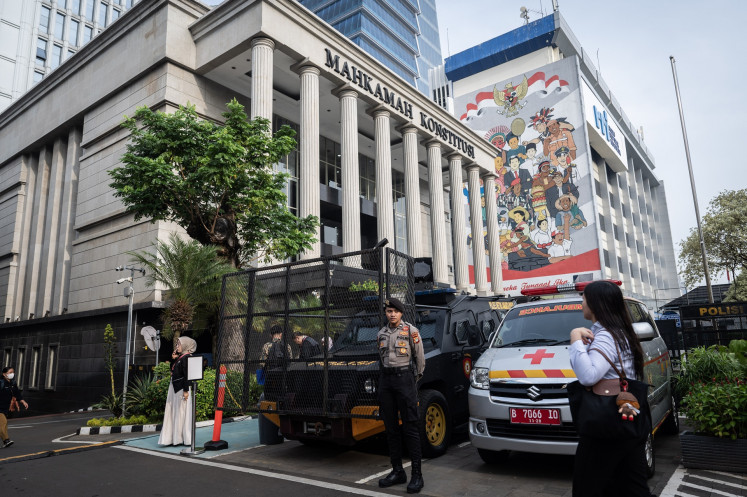Open door policy for diaspora needs details
President Joko “Jokowi” Widodo’s speech themed “Visi Indonesia” (Indonesian vision) has given a breath of fresh air to Indonesian diaspora
Change text size
Gift Premium Articles
to Anyone

P
resident Joko “Jokowi” Widodo’s speech themed “Visi Indonesia” (Indonesian vision) has given a breath of fresh air to Indonesian diaspora. The President ensured that the diaspora would be part of his big plan to develop human resources.
There are at least 7 million members of the Indonesian diaspora working in various fields globally but their potential has largely been untapped for the good of the nation, except remittances they send back home. They are not just involved in common or “ordinary” work; some of them are actually involved in strategic projects overseas.
In his speech, he said he would establish a national talent management organization that would pool diaspora and other stakeholders.
How he will utilize the diaspora remains to be seen, but the commitment has won appreciation from the Indonesian diaspora community, who support the realization of the agenda.
To make full use of the diaspora, the government should have a well-managed database that enables it to pinpoint exactly who, what and where the diaspora are.
This step is important to clearly understand the true potential of the Indonesian diaspora. The database will help the government quickly connect issues it is facing and skills and talent that it needs.
Indonesian embassies, as the hub of diaspora, need support from the national talent management to map the diaspora. When the map is completed, the government should engage with the diaspora and find out which national projects or agendas will need the expertise and skills of the diaspora.
Linking and matching the national projects and the diaspora can be conducted gradually. We can start from the energy field, for example, before moving to agriculture, education and other sectors. Eventually, we can integrate the diaspora in the national development plan and agenda.
Indonesian diaspora play at least three major roles. First, the Indonesian diaspora can facilitate skills and technology transfer that will speed up development. Indonesian diaspora are at the frontier of new technology development and can provide technical solutions to the country’s need for clean energy, more efficient infrastructure materials or more productive land for different agriculture crops.
Second, Indonesian diaspora can help connect the government with foreign investors. As they live and work abroad and build their network, they have a better position to map potential industry players who can be wooed to invest in Indonesia.
Instead of the door-to-door strategy, entrusting the diaspora to maximize their network will be a new strategy to lure foreign direct investment.
Third, the Indonesian diaspora can support development of the country’s tourist industry. Involvement of the diaspora can cut the cost needed to promote Indonesian tourism overseas.
But they need training, up-to-date knowledge about Indonesia and promotion materials to convince foreigners to spend their holidays in Indonesia. Integrating the diaspora in the country’s tourism agenda is therefore imperative.
President Jokowi’s vision to utilize the Indonesian diaspora properly deserves plaudits and full support.
Many members of the Indonesian diaspora are enthusiastic about contributing to Indonesian development and they are eagerly waiting for an opportunity to do so.
Their skills and ideas are highly appreciated overseas and will surely benefit the nation. Many of the diaspora also wish to show Indonesia off to their international network and create jobs for their compatriots at home.
President Jokowi’s “open door policy” for Indonesian diaspora should be translated into strategic steps by his ministers and staff.
The policy could merely be a small step for the government but a giant leap for Indonesia to realize its dream of becoming a great nation.
_______________________________
The writer is founder of the Association of Indonesian International Scholars, vice chairman of Democracy Institute through Science and Technology (IDST) at The Habibie Center and senior manager sustainable sourcing at Unilever Indonesia. The views expressed are his own.









